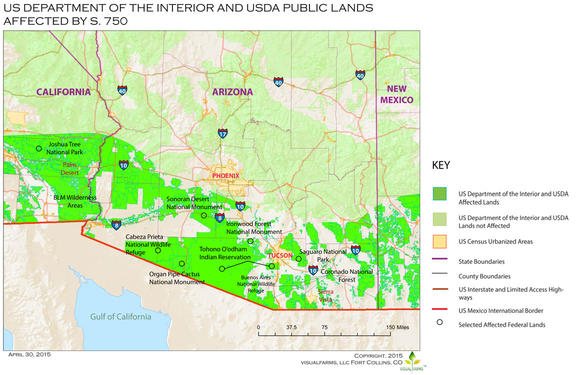Artículo
Senator John McCain Is Pushing an Extreme Border-Security Bill That Tramples on the Environment
Senator John McCain Is Pushing an Extreme Border-Security Bill That Tramples on the Environment
Publicado el 5 de mayo de 2015
por Chris Rickerd, ACLU Washington Legislative Office en ACLU
The bill up for a vote is the Arizona Borderlands Protection and Preservation Act, otherwise known as S. 750, sponsored by the state’s two senators, John McCain and Jeff Flake. Despite the bill’s name, there is nothing protective or preserving about this legislation. Rather it threatens to despoil a vast, 10-million-acre area of Arizona without any remotely corresponding border-security benefits. It would allow the government to conduct motorized patrols and to deploy communications, surveillance, and detection equipment on protected public lands, such as national parks, national monuments, and sacred Native American sites.
Environmental groups are horrified because laws like this “pose significant risks to our nation’s environment and public lands, and the rule of law.” The Coalition of National Park Service Retirees has called legislation similar to the McCain/Flake bill “the most direct assault on national parks ever to be advanced at any level in any Congress in U.S. history. . . . The outrage here is that national parks and other U.S. crown jewels could end up being trashed in the name of achieving national security gains that are fictitious.”
The real goal of the bill, however, is to entirely seal the Southwest border, which is unattainable. As the map below shows, the bill covers Arizona federal public lands equivalent to roughly twice the size of Massachusetts. A February 2015 report by the Bipartisan Policy Centerstresses that “achieving 100 percent enforcement is an unrealistic expectation in any border security effort,” noting that even the former East Germany’s “kill zone” stopped only 95 percent of crossers.

What makes this legislation even weirder is that Customs and Border Protection itself does not want the authority Arizona’s senators are trying to impose on it. Instead, the Department of Homeland Security, CBP’s parent organization, has repeatedly disclaimed the idea that such legislation is required to further border security.
All of this is distressing, particularly since Americans do deserve border policy reform, just not like this.
What any border bill should include are reforms to CBP that ensure the agency’s oversight and accountability. Its own former head of internal affairs has called at least eight of the 35 CBP-caused deaths since 2010 “highly suspect,” adding that “thousands of employees hired during an unprecedented expansion of the agency in the post-9/11 era are potentially unfit to carry a badge and gun.” (See here for yesterday’s CBS News report on Border Patrol sexual abuse). And Politico Magazine’s in-depth look at the Border Patrol’s massive growth concluded that it is “America’s most out-of-control law enforcement agency.”
But McCain and Flake’s bill goes in exactly the wrong direction by expanding Border Patrol’s operations, instead of restoring respect for the rights of border residents and their environment. Border Patrol frequently acts as a “Constitution-Free Agency” in border communities up to 100 miles from any land or sea border. CBP urgently needs reforms to adopt best policing practices such body-worn cameras, an end to racial profiling, and the type of comprehensive data collection lifted up by the President’s own Task Force on 21st Century Policing.
A vote for this bill is also a vote against comprehensive immigration reform because its enforcement-only approach offers no workable solutions to the broken immigration system, none of the common-sense immigration fixes that would benefit America enormously.
Senators should oppose S. 750, leave 10 million acres of Arizona alone, and instead enact sensible border and immigration reforms.
Clasificación
País
Estados Unidos
Temática general
[Vigilancia migratoria en Estados Unidos][Frontera][Frontera][Frontera]
Temática específica
[166][199][44][46]

Artículos recientes
Publicada el 11 de agosto de 2020
¿Qué necesita un migrante para trabajar en México?
Publicada el 18 de febrero de 2020
¿Expulsar o integrar a las personas migrantes en México?
Publicada el 21 de diciembre de 2019
“Ya no aguantamos más”: la protesta desesperada de inmigrantes presos en las cárceles de ICE
